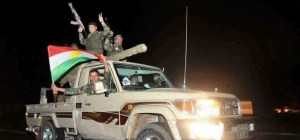nsnbc : British MP Jack Lopresti, chair of the All-Party Parliamentary Group on Kurdistan, warned in a statement published by the group on Friday, that Western nations should check Iranian influence in Iraq pushing Kurdish and Iraqi parties towards a possible conflict.
 The statement released by Jack Lopresti and the All-Party Parliamentary group the MPs stress that “The unwarranted aggression of the Shia militia against the Peshmerga in Kirkuk is far less to do with the post-referendum dispute between Iraqis and Kurds than Iran exploiting these divisions for its own ends.”
The statement released by Jack Lopresti and the All-Party Parliamentary group the MPs stress that “The unwarranted aggression of the Shia militia against the Peshmerga in Kirkuk is far less to do with the post-referendum dispute between Iraqis and Kurds than Iran exploiting these divisions for its own ends.”
Thursday night, some 6,000 additional Peshmerga were deployed to Kirkuk to counter a buildup of Iranian-backed Shiite Hashd al-Shaabi forces. Kurdish security and government officials had previously issued several warnings of abnormal movements of Iraqi and Hashd forces near the disputed areas of Kirkuk and northern Nineveh province.
The escalation has come in the wake of Kurdistan’s independence referendum that reportedly saw 92.7 percent support for separation from Iraq. nsnbc has attempted to attain detailed figures for regions and cities including Kirkuk from the Kurdistan Region’s High Election and Referendum Commission but did not receive the date or a reply. Kirkuk, however, is not the only region where Shia militia and Kurdish Peshmerga are facing each other.
Shia – Iranian-backed militia expelled 70 Kurdish families from Khurmatu leading Kurdish Peshmerga to organize a resistance against the Iranian proxies there. The town of Khurmatu is in Iraq’s northern Diyala province. Its population is nearly 220,000 people including all its towns and villages. The Kurds make up 55 percent of the population, the Arabs 15 percent, and the Turkmen 30 percent.
Iraqi Prime Minister Haider al-Abadi, who is commander-in-chief of the armed forces of Iraq and nominally in charge of the Hashd al-Shaabi, has said he will not fight the Kurds. “We will not use our army against our people or fight a war against our Kurdish and other citizens,” he told a gathering of Anbar provincial authorities on Thursday.
All-Party Parliamentary Group Lopresti, however, said it appears “Abadi is being sidelined” as he sees Iran’s hand behind the “unwarranted aggression” of the Shiite forces against the Peshmerga, noting that Iranian Quds commander Qassem Soleimani has been in Baghdad recently. He called on the UK government to raise the matter at the UN to urge “an immediate halt to offensive military actions” and encourage dialogue between Erbil and Baghdad.
“It would be catastrophic for Kurdish/Arab relations were the Iranian proxy militia to use American weapons against our vital allies in the Peshmerga. It would demonstrate a complete abdication of responsibility to Iranian backed forces that have no interest in a peaceful settlement between Baghdad and Erbil – the key actors in the post-referendum discussions,” Lopresti stated.
The British MP is not the only voice calling for Western intervention to check Iranian expansion in a divided Iraq. Zalmay Khalilzad, former US ambassador to Iraq, called on “active US engagement” to prevent conflict between the Shiite forces and the Peshmerga, spurred on by Iran. The administration of US President Donald Trump is worried about growing Iranian influence throughout the Middle East as well.
However, speaking to reporters at the Pentagon earlier this week Maj. Gen. Robert White said “I’ve actually got absolutely zero proof that anybody at the senior level of the Iraqi Security Force apparatus has sent any threatening messages to the government in Erbil, or their partners in this fight against [the Islamic State].” But then again, White not having seen proof doesn’t necessarily imply that he has been looking – some say White’s statement was a political attempt to defuse the situation rather than a reflection of realities on the ground.
On Friday afternoon, Kurdistan Autonomous Region Prime Minister Nechirvan Barzani called on the international community to intervene to prevent a “new war” between Iraqi and Kurdish forces, a war that he said would have “direct, grave consequences” that would be felt across the Middle East. As of Friday afternoon, the Peshmerga have withdrawn from a few outposts and have fortified their positions in a line of defense they believe can be protected with minimum casualties if conflict does break out in the oil-rich province.
CH/L – nsnbc 14.10.2017
Related background articles:
Chief of Iran’s Expediency Discernment Council claims Iraqi Kurdish independence leads to war
Iranian-backed Iraqi Shi’ite militia leader threatens war if Kirkuk joins Kurdistan in referendum
Source Article from https://nsnbc.me/2017/10/14/british-mps-urge-western-nations-to-check-iranian-influence-pushing-kurdish-and-iraqi-parties-towards-conflict/
Related posts:
Views: 0
 RSS Feed
RSS Feed

















 October 14th, 2017
October 14th, 2017  Awake Goy
Awake Goy 










 Posted in
Posted in  Tags:
Tags: 
















